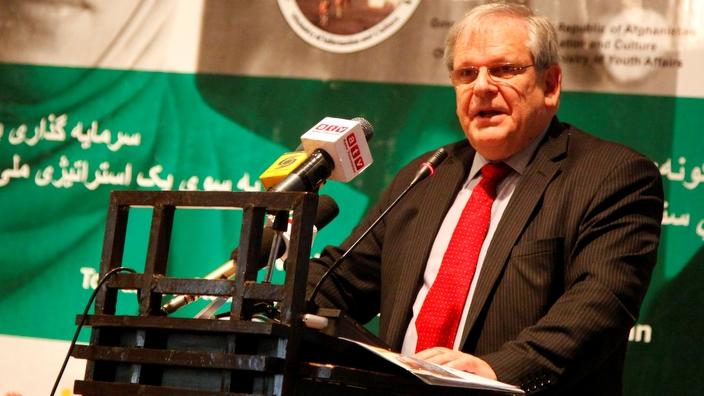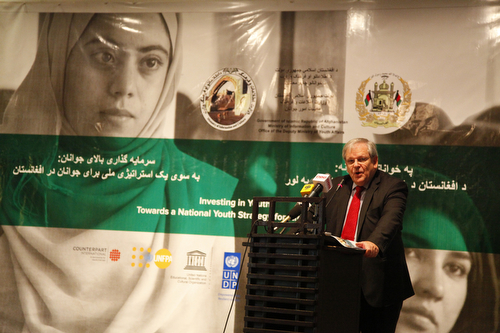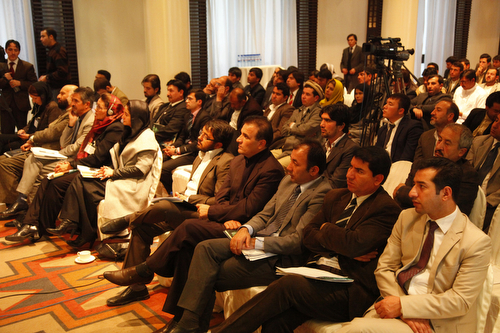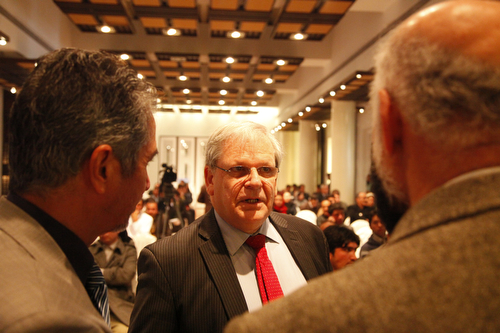KABUL - Addressing a conference in Kabul today, a senior United Nations official praised efforts to develop a youth policy for Afghanistan, and emphasized the international community’s support for its implementation.“This is a critical milestone in our joint efforts to provide young women and men in Afghanistan with the opportunities they deserve,” the Secretary-General’s Deputy Special Representative for Afghanistan, Mark Bowden, who also serves as the UN Resident Coordinator, told a high-level expert conference in the capital, entitled ‘Investing in Youth: Towards a National Youth Strategy for Afghanistan.’
The Afghan Government has been working the international community and civil society, with the latter including representatives from youth organizations, in developing a draft National Youth Policy.
Afghan youth constitute the largest single demographic in the country, with some figures estimating that youth under the age of 25 account for up to 63 per cent of the population. In terms of education, around eight million children are currently enrolled in school, but there are still four million children – the majority of them girls – who are out of school.
In his remarks, Mr. Bowden said the draft policy “must not just be another document,” and should lead to real change and tangible improvements for the lives of the country’s young people, especially for marginalized youth, through the provision of a framework for allocating resources for adolescents and youth in the most coordinated, targeted and effective manner.
“Through this policy, the Government, civil society and their partners from the international community have made a promise. It is now time to deliver on that promise and to show the young people that we are accountable to them,” the UN official said. “That is why this conference, which is the first step for developing the National Youth Strategy, is so critical.”
“The success of the policy and strategy will depend on whether these documents will lead to real change at the sub-national level, in the under-served districts and communities. We, as the UN family, will make sure to work closely with our provincial partners from the Government and civil society to achieve an impact on the lives of young women and men where it’s most needed,” Mr. Bowden added.
The draft policy sets out priorities for the strategy to address. These include: investment in the health of the country’s adolescents and youth, including their health rights; investment in better education; the creation of decent jobs for the country’s youth; and youth’s full participation in society and its development.
“None of these priorities will be easy to achieve. Taken together we can see that the challenge ahead is huge, but the Government has taken an important step in developing the National Youth Policy,” said Mr. Bowden. “I would like to reassure the Government: we are ready to continue to work with you to ensure that the policy will be implemented.”
Secretary-General Ban Ki-moon has made working with and for young people one of his top priorities in the Five-year Action Agenda for his second term in office, which began in 2012. Given that the world currently has the largest generation of young people it has ever known, the priority item aims to deepen the youth focus of existing programmes on employment, entrepreneurship, political inclusion, citizenship and protection of rights, and education, including on reproductive health.
In response to the Action Agenda, the UN Inter-Agency Network on Youth Development has prepared a so-called System-wide Action Plan on Youth which requests Member States to intensify efforts towards a more coherent, comprehensive and integrated approach to youth development.
“The UN family in Afghanistan is very committed to the System-wide Action Plan on Youth and will jointly support the Afghan Government in strengthening strategies and programmes on youth development,” the UN official noted in his remarks.
Those attending today’s conference included Afghanistan’s Minister of Education, Farooq Wardak, Minister of Information and Culture, Sayed Makhdoom Raheen, as well as the Deputy Minister of Youth Affairs,Timor Shah Eshaqzai, and civil society representatives. UN bodies represented at the gathering included the International Labour Organization (ILO), the UN Educational, Cultural and Scientific Organization (UNESCO), the UN Population Fund (UNFPA), the UN Children’s Fund (UNICEF) and the UN Development Programme (UNDP), as well as the World Bank.
The UN agencies, funds and programmes jointly support the Afghan Government’s efforts in the area of youth by providing specialized technical expertise to develop a strategy that is “both relevant and practical” and aims at achieving change at the sub-national level, Mr. Bowden noted.
The UN Resident Coordinator concluded his speech to the conference by calling on the international donor community to continue to support investments in young people, noting that the implementation of the draft National Youth Policy will require a substantial amount of financial resources.
“It is therefore important that the donor community, too, is part of the development of this strategy from the very beginning,” Mr. Bowden said.









